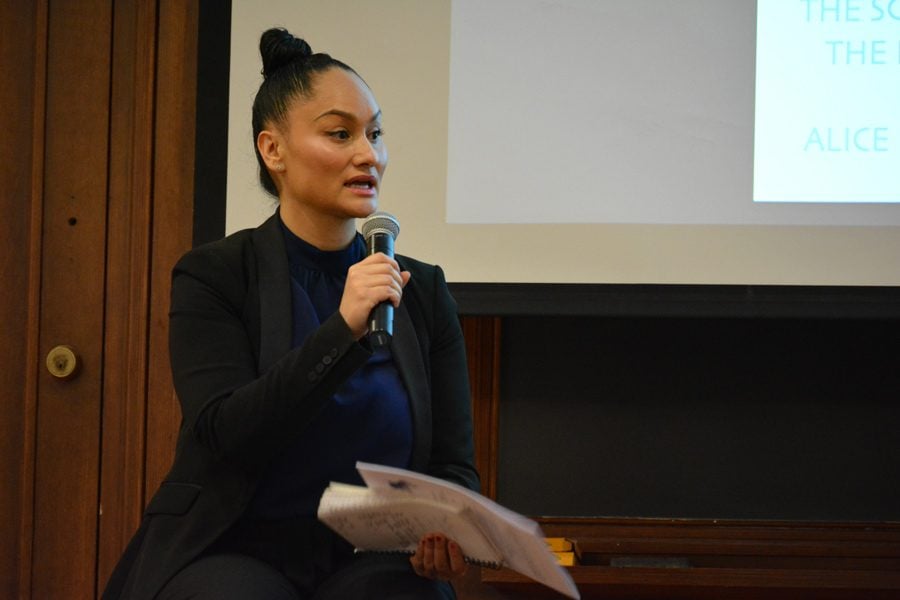Women’s March co-chair reflects on career in activism
January 15, 2018
Carmen Perez, the national co-chair of the 2017 Women’s March on Washington, said she never regarded herself as an activist. Instead, she described her role as more of a “bridgekeeper” seeking to connect marginalized groups, she said.
“(Bridgekeepers are) those that create bridges between youth and elders, those that have influence and those that are working on the ground,” Perez said. “(It’s) my responsibility to build bridges among communities whether they represent me or look like me or they don’t.”
Speaking to a crowd of about 100 at the closing keynote of the Northwestern University Community for Human Rights conference Saturday in Harris Hall, Perez discussed her experiences of growing up in a multicultural neighborhood and tackling human rights issues across the globe.
Perez said she decided to dedicate her life to empowering women in 1994, when her sister — who was always plagued by the thought that “she was not good enough” — was killed in a car accident. Since then, Perez has worked on social justice projects such as The Gathering for Justice, a nonprofit aimed to end child incarceration and eliminate racial inequalities in the criminal justice system.
The idea for the Women’s March, which took place Jan. 21, 2017, originated from a Facebook post by a woman who “felt devastated” after Donald Trump’s presidential victory. The protest drew worldwide support from 5.2 million people, making it the biggest political demonstration since the Vietnam War, Perez said.
Weinberg senior Liam White, director of community development for NUCHR, said the organization invited Perez not only because of the “visibility and fame” she obtained from spearheading the Women’s March, but also her longtime dedication to civil rights projects.
“Her recognition comes from (the Women’s March), but to realize there is a lot of work she has done behind the scenes … is the message we want to send to people,” White said. “We want to make sure that people are continuing to feel like they can go out independently (and) get new initiatives started that can help Northwestern, Chicago and the world.”
Perez said her team examined the drawbacks of past approaches to public demonstration and considered potential improvements.
“The amnesia we have is that a lot of what’s happening today has already happened,” Perez said. “If we really understood how previous movements failed … if we are actually able to connect with those that were working during that time, we can potentially do things in a different way.”
However, Perez said the Women’s March was also confronted with criticism centering on a perceived lack of inclusiveness, as some said the march tokenized women of color. In response, she said the organization strived for “intersectionality” by addressing concerns from different marginalized groups, and told critics to “stay on the sidelines” unless they also offered solutions.
Medill freshman Arudi Masinjila said she had worked with Perez during an internship at The Gathering for Justice. While the past experience showed her that individuals could be powerful in prompting social justice reform, Masinjila said the Saturday event taught her that reaching out to a diverse group of people could be more effective.
“We need to include many voices in the conversation and bring different people together to actually be able to have a wholesome view of the problem and how to solve it,” Masinjila said.
Email: LimingWan2021@u.northwestern.edu
Twitter: @piuadrianw



